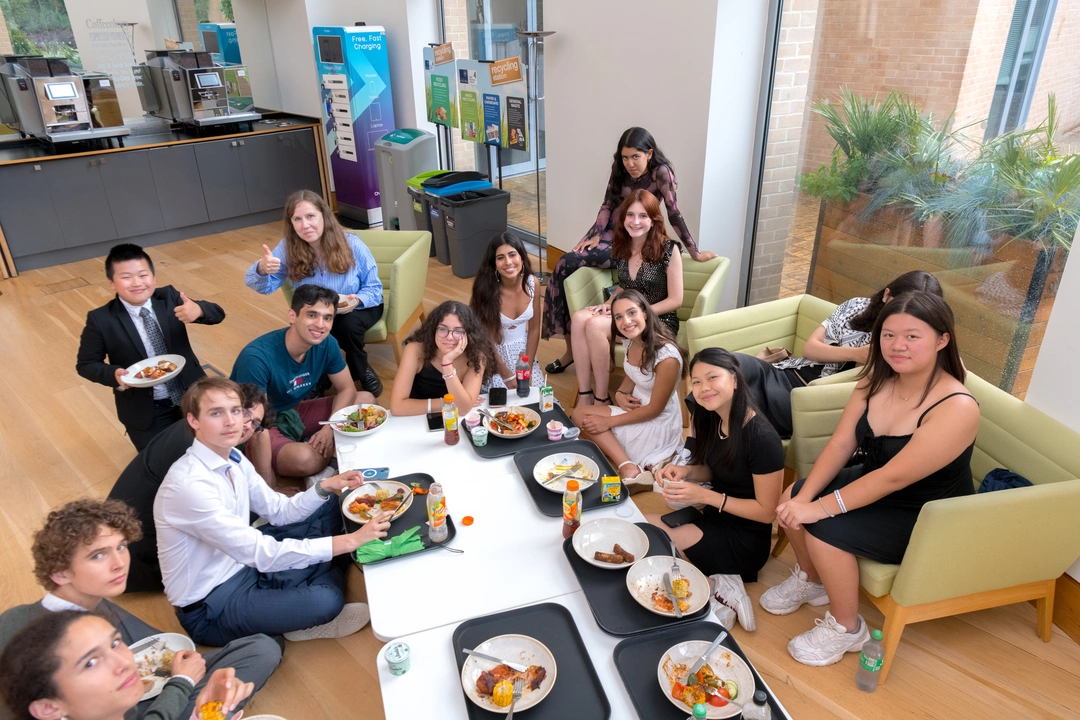Should I Take a Gap Year If I’m Not Sure What to Study at University?

Are you aged between 15 and 18? Is your head spinning with degree options, different universities and colleges, and career paths?
You’re most definitely not alone. Almost everyone feels uncertainty about their life pathway to some extent, and especially at the time of leaving school.
“Here’s a little secret: I was having cold feet till the very last day of university applications.” – Valerie (gap-year taker)
An undergraduate degree is a huge commitment of both money and time. Tuition fees are no joke, and degrees can sometimes take up to six years to complete! It’s therefore imperative that any decision you make about your academic career is informed.
That said, it’s never too late to change your academic trajectory. Whatever your choices after leaving school may be, nothing is final. For instance, many universities allow their students to transfer to different courses if they change their minds during the degree. It’s also possible to switch subjects and fields at postgraduate level, or to enter a professional field unrelated to the studies you’ve completed.
If you know that you want to go to university, but you’re not sure exactly what you want to study, you might be thinking about taking a gap year.
First, though, let’s cover exactly what a gap year is.
What Is a Gap Year?
A gap year is typically a period of twelve months between programmes of full-time study or work, usually taken after leaving school and before starting university. It’s so-called because you’re having a “gap” between your studies or work placements.
The gap year has gained popularity as a choice for a range of students, whether it’s used for time to think about your academic direction, time to work and save money ahead of starting university, or time to travel or embrace other opportunities for a year. A gap year is not “time off”.

When can you take a gap year?
Before university isn’t the only time you can take a gap year. There are multiple points at which you can take time out from full-time education, each with their own advantages and disadvantages.
1. After leaving school and before beginning university
2. After finishing an undergraduate degree and before beginning postgraduate studies
Both of these options allow you to make the most of all the opportunities of a gap year before committing to your next step. You can use the time to ponder what it is you really want to do, perhaps selecting your degree subject, while gaining many experiences which can help you throughout your life.
While this is certainly an exciting time for a gap year, it’s important to note that you may also find yourself feeling left behind and lonely, as all of your school friends begin the shared experience of university life or stable work after school.
3. After finishing education and before beginning employment
This allows you to gain valuable CV-boosting experience before beginning to apply for jobs which can give you a competitive edge over your peers, but you may end up feeling like a “late starter” in comparison. If you’re entering a degree-central field, such as medicine, you may also worry about potentially forgetting your course material.
4. Between degree years (for example, suspending your studies between the first and second years of your chosen undergraduate course)
This option is usually only taken in exceptional circumstances, such as for mental or physical health reasons. Unlike gap years between periods of education, you can only suspend your studies if your university tutors agree to it. You cannot plan to suspend your studies until you are at university, and every university will have a different policy on this.
In exceptional circumstances, it can be highly beneficial to take a break from the pressures of academic rigour, but you may feel like you’re falling behind as your friends move on in their academic career without you. At this stage you’re usually set on your degree, but you can also take this time to consider transferring academic pathways, whether this be between universities or towards the world of employment.
5 Reasons Students Choose to Take a Gap Year
Now that we’ve gone over what a gap year is, and when you can take one, it’s time to discuss five of the reasons that you might find taking a gap year worthwhile if you’re uncertain about your future.
1. Self-discovery and clarity
A gap year can be a time to think deeply about your life goals and which academic pathway is right for you. Without the pressure of immediate academic commitments, you might explore new and old interests and learn about your specific values. This can help you to gain clarity about where it is that you wish to go in life, and to choose a degree, university or alternate path that aligns with your newfound passions.
For instance, after leaving school at 18 you might take a year to return to a hobby you once enjoyed, such as music or drama, which may inform you of alternative pathways in higher education such as attending a conservatoire. You might travel the world and feel your heart touched by the calls of environmental science.
You might not find that you need an entire year to gain clarity, and that you can in fact use techniques of self-reflection and goal setting to lessen the uncertainty about your future while still in school or university.
2. Gaining real-world experience
By using your gap year to complete an internship, volunteering placement, or to enter into employment, you can gain valuable, hands-on experiences which not only can help you better understand the different industries and potential career paths available to you, but which will also boost your CV as you show future employers your unique real-world experience.
If you undertake paid work during your gap year, you can also earn money and begin saving towards your future.
It’s worth noting that it’s possible to gain work experience in school, such as by working or volunteering part-time, or attending an online work experience internship.

3. Personal growth and independence
Taking a gap year can foster personal growth, self-confidence and independence. You’ll be taking a route which many of your peers might not be taking, forging your own path. You’ll need to depend on yourself more than ever in the absence of guidance from teachers and tutors, funding yourself for what might be the first time, travelling to places you have never been to and taking part in activities you’ve never done before.
You’ll surely find friends and mentors to help you along the way, but before you can establish these relationships you must first be strong in yourself and your own unique identity. Taking a gap year can accelerate this personal development, which can set a strong foundation for your future: academic, professional and otherwise.
4. Building a unique resume
Gap year experiences can make your CV stand out. You might have completed an internship, engaged in volunteering, or worked a job. Equally, you might have spent the year doing other activities, such as travelling.
Admissions officers and employers often appreciate applicants who have diverse experiences that contribute to their personal and professional growth. Moreover, you might have gained some specific hands-on experience in the field you wish to go into on your gap year, giving you the competitive edge over applicants who took the more conventional route.
Once again, it’s perfectly possible to gain relevant work experience as a student at school or university, whether it be through paid or unpaid employment.
5. Avoiding academic burnout
“I finally had my dream: a year with no education, no deadlines and no drama.” – Hannah (gap-year taker)
A gap year can also be used as time for a much-needed break from academia. In the UK, children are generally enrolled in school aged five, and many will be in continuous education until at least age 21 – that’s 16 years of full-time education!
By resting on your gap year, you can return to your studies with renewed motivation and focus. However, this shouldn’t mean you ignore your mental health while you’re completing your studies in anticipation of a gap year to recover!
7 Things You Can Do With a Gap Year
“The stated reasons for wanting to take a gap year primarily involve gaining independence and taking a break from education, rather than saving money to go to university.” – Crawford and Cribb, 2012
According to a 2012 study funded by the UK’s Department for Education, gap years can often be unexpected decisions. The study also found that most gap-year takers spend their time productively, with over 80% of the studied group reporting working in Britain at some point in their gap year, with travelling and working abroad being other popular choices.
Now that we’ve seen five reasons why you might want to take a gap year, let’s get a little more specific about what you can do with your time, with seven things you can do with a gap year.
1. Travel and cultural immersion
The stereotypical gap year is one of travel. You could follow in the footsteps of many gap year students by using your time to explore new cultures, languages and traditions by travelling to different countries. You might attend an international summer school, or decide to work abroad.
Do you speak a second language, or have a desire to learn in a way far more stimulating than reading a textbook in your bedroom? You might engage in cultural exchange programmes, such as studying abroad or participating in language immersion courses.
Your experiences outside of your hometown can help you to gain a broader perspective on the world, and even discover potential academic interests, such as modern languages, global sciences or diplomacy. You might find an interest in diplomacy and foreign relations, or debating, for example.

2. Volunteering for social causes
You might wish to dedicate your time to volunteering with non-profit organisations or community initiatives, where you can make an active contribution to causes you’re passionate about, such as environmental conservation, social justice or education.
Volunteering can help you to develop a sense of purpose, and also to consider other degree options that you might not have thought about, such as those related to social work, humanitarian studies or environmental science.
3. Interning or working
You can use your time to secure internships or entry-level positions in industries that intrigue you, even if they’re outside your intended field of study.
You’ll gain practical work experience, build a professional network, and explore potential career paths, discovering which industries align with your interests and skills for informed academic choices.
4. Pursuing creative projects
You might want to dedicate your gap year to creative endeavours you would otherwise not have the time to do, like writing a book, composing music, creating art or filmmaking. In spending your time this way, you can hone your creative talents and explore degrees related to the arts, literature or media studies.
This also means that when the time comes to apply to colleges or universities, you’ll have your own creative portfolio to showcase and spotlight in your application, making you a stand-out candidate.

5. Skills-building programmes
During your gap year, you can enrol in skills-building programmes or courses to enhance your practical skills in areas like coding, digital marketing or graphic design. You’ll be gaining work experience which grants you in-demand skills, which can not only complement a wide range of academic pursuits, but also make you stand out as a well-rounded candidate when applying to colleges or pursuing future career opportunities.
6. Take extracurricular courses
There are many gap year and summer programmes which you can enrol in that allow you to explore your academic interests, while not being enrolled in full-time education.
You can also explore more unique educational experiences such as sustainability programmes, wilderness expeditions, or leadership development courses. Academic internships are also valuable experiences available to you on your gap year.
In spending your time in this way, you can develop new skills and interests that can influence your academic and career decisions.
7. Self-discovery and personal growth
You might dedicate part of your gap year to self-reflection and personal development. You can explore your passions, values and long-term goals through journaling, meditation, or self-assessment tools. In this way, you can gain a deeper understanding of yourself, which can guide your academic choices and career aspirations.
So, we’ve seen what a gap year is, when you can take one, five reasons why you might want to take one, and seven things you can do on one. One question remains: should you take a gap year if you’re not sure what to study at university?
The answer inevitably falls to you. Only you can decide how to spend your time. We have reasons both for and against taking a gap year at this stage in your life – there’s no “right” or “wrong” answer. That being said, an undergraduate degree is a once-in-a-lifetime experience – if you know what you want to do, go for it! But if you’re still a little bit unsure, remember that you can take time to think.

By Jen Protheroe
Jen is a finalist studying Classical Archaeology and Ancient History at the University of Oxford. Outside of work, Jen enjoys spending time in nature and is a strong advocate for the mental health benefits of this – although she does like to soundtrack her peaceful, scenic routes with punk, rock and metal music mixes.
Recommended articles
OxBright Tutors Share Their Top Tips for High School Graduates
Finishing high school can be a really intimidating juncture – you’re leaving the security of a routine you’ve followed for five plus years, and you’re faced with more options and less structure than ever before. Oh, and your decisions now can shape your future in a...
Which Career Is the Best Fit for Me?
Choosing your career path is one of the first big steps you’ll take as a young adult, so it can often be a daunting prospect. However, the possibilities are endless, and as long as you base your choices on your personal preferences, passions and interests, your...
How to Make a Study Schedule That Actually Works
Studying can sometimes feel like a daunting task, no matter how old you are or what level you’re studying at. You might be left thinking: How can I balance academics with my other commitments? How do I stay consistent with a study schedule? Is there a “good” or...



